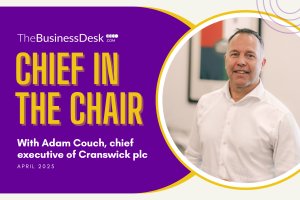Talking Business: Schofield assesses legal sector’s future

IT may be a time of change for the legal industry, but success can still be achieved as an independent firm. Chris Schofield of Schofield Sweeney met Ian Briggs and Baker Tilly’s Paul Byrne and Mike Jackson to make his point.
CHRIS Schofield is in a good position to give his verdict on the state of the legal industry. He has been at the head of Schofield Sweeney for almost 15 years during which time he and Martin Sweeney have grown the Yorkshire law firm to boast 20 partners and almost 100 staff.
Prior to that, the Bradford Grammar School educated lawyer trained at Hammond Suddards and was an associate partner at Dibb Lupton Broomhead before being appointed general counsel, company secretary and a director of Filtronic, a company he acted for when it floated on the stock market.
He then teamed up with Mr Sweeney to launch Schofield Sweeney, a firm offering services ranging from commercial property to education and corporate and commercial.
One of the secrets of the Bradford and Leeds-based firm’s success, believes Mr Schofield, is its partner-led approach and the investment of time in getting to know a client’s business and its people.
“I do think it’s about offering an appropriate service to the market and I don’t think that the vast majority of SMEs can get a small legal job done well,” he says. “It shouldn’t be about price but about service.
“I don’t think that the number of plcs headquartered in the region is what it was 20 years ago. There are a large number of SME businesses and we have been able to address opportunities in the SME market because we can provide the services that previously only the large regional law firms were able to do so.
“As those larger firms have moved away from the SME market we’ve been one of the firms able to fill the gap they’ve left. I think a firm of our size with our pricing model and a real commitment to service should do well in that part of the market.
“The people that pay your management and staff are the clients. So grow with your clients.”

“We’ve only been able to develop our business by building our team of lawyers and keeping it together; even during the last recession,” says Mr Schofield.
“When the recession started we said we wouldn’t do anything that would lead to the team having to be broken up. We have plotted our own course and we have grown by attracting people. Our experience is that you have to have senior lawyers to build things around.
“The recession provided us with an opportunity to recruit people that we wouldn’t otherwise have been able to recruit. In 2008 there were really very good people coming on to the market and we had the financial resources to be able to employ them. It was a brave decision; I think people thought we were nutcases.
“I am surprised by how much debt some law firms have on their balance sheets. I think we’ve managed ourselves well but I don’t think that law firm management is rocket science.
“There were a lot of law firms who saw a significant turndown in business and they’re all fixed cost organisations. In that situation if you’ve got falling profits and turnover and high debt and need support from a bank you’ve got problems.”
Mr Schofield and Mr Sweeney have known the partners at Baker Tilly since before Schofield Sweeney was formed and have discussed the firm’s progress with Baker Tilly during its growth.
“As a firm we manage ourselves conservatively from an accounting and tax perspective” says Mr Schofield, who was taking part in the latest Talking Business interview, supported by Baker Tilly.
“However, we’ve been through big office expansions in both Leeds and Bradford and Baker Tilly helped us claim all the capital allowances that were due to; which was very helpful.
“We have looked at a number of tax planning ideas. Some of the ideas we’ve seen do pose potential problems for salaried partners at the firm. It’s about looking at all aspects and we wouldn’t want to be doing anything for a short term gain that could jeopardise things. People who join us want to spend their careers with us.”
Mr Byrne added: “In their early years Schofield Sweeney were with a smaller firm but as they grew they decided they needed a broader range of advice so they came to talk to us. It wasn’t a competitive tender situation they just said it seemed to be the natural thing to do to appoint Baker Tilly, there was only one choice.”
An area that Schofield Sweeney has capitalised on, and has subsequently become a national expert on, is the establishment of academies.
“We’re probably the market leader in the country on academies,” says Mr Schofield. “Academies are probably one of the Government’s success stories.”
Mike Jackson, partner at Baker Tilly, a leader in the academy sector, said: “Academies are businesses and they are businesses that can be up to £50m turnover. We have been in the academy market going right back to 2006. Academies came into existence because of failing schools and we took the opportunity presented by using our Charity sector expertise.
“This year the Education Funding Agency has registered 1,660 academies. The Department For Education is projecting 3,000 new academies a year. Fifty-five per cent of secondary schools have converted. And many that have converted have associated primary schools.
“Corporate governance advice is needed and corporate lawyers are involved. There is a massive opportunity for those taking that opportunity like Schofield Sweeney are.”
Commenting on the outlook for the legal sector in Leeds, Mr Schofield said: “There should be some consolidation in the market. There are some firms doing the same things in Leeds and if you put these things together that can and should drive profitability.
“We want to continue to grow the business. The market place is challenging.”
Asked if Schofield Sweeney would look to tie-up with another firm, he said: “Never-say-never but we’re not planning on it. But we’re looking to add to the solicitors we have. If you do that your client base grows.”
Alternative Business Structures, introduced as part of the Legal Services Act, are being viewed by many as leading to the biggest shake-up in the legal industry for many years.
Under ABS, law firms can change their ownership arrangements away from share-holding partnerships to structures more aligned to non-law businesses such as banking, insurance and financial services, and can also receive backing from external investors.
Commenting on ABS, Mr Schofield said: “At the moment I don’t think we’ll be affected directly. We’ve not got the high street work that might be affected by the likes of the Co-op and Tesco.
“But I do think you’re more likely to see private equity firms investing in law firms.”
He believes those that are likely to list or get private equity backing are those with government contracts or who deal in areas such as personal injury.
“However, the changes might allow us to grow a business and sell a business,” he added.
Also in the Talking Business series:







